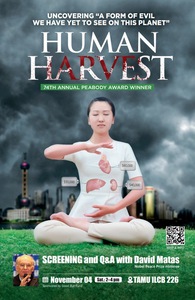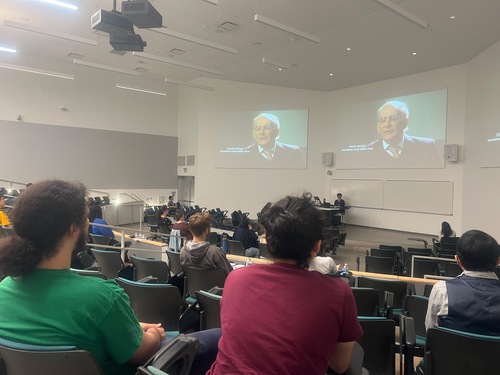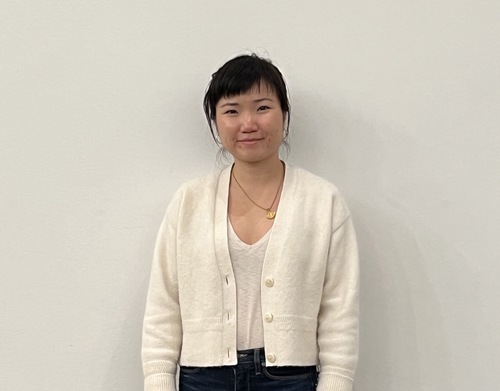(Minghui.org) The Falun Dafa Club of Texas A&M University screened Human Harvest on campus on the afternoon of November 4, 2023. The documentary exposes the Chinese Communist Party (CCP)’s large-scale organ harvesting from Falun Dafa practitioners.
Texas A&M University, located in College Station, is the first public university in Texas and the sixth largest public university in the United States. The screening was sponsored by the Good Bull Fund, which was established by the Chancellor’s Office to support student-led events.
Many teachers and students watched the film. Some said the information was shocking and painful. They condemned the CCP for conducting live human organ harvesting and said it must be stopped. They also firmly believe the atrocities will eventually end and justice and truth will prevail.
Human Harvest won many awards including Best Documentary Award at the 2014 Hamilton Film Festival in Canada, the 2015 Peabody Award, and the AIB International Investigative Documentary Award. The film tells the story of an independent investigation into the large-scale crime of harvesting human organs from living Falun Dafa (Falun Gong) practitioners and killing them on demand. The investigation was led by David Kilgour, a veteran politician and former Director of the Asia-Pacific Division of the Canadian Ministry of Foreign Affairs, and David Matas, a renowned human rights lawyer and activist.
Human Harvest references numerous reports and images from official Chinese websites, and provides testimonies from many interviewees. The audience saw that this illegal human organ trade is being carried out by the CCP. In order to obtain and sell organs for profit, prisoners of conscience are killed. Falun Dafa practitioners are the main victims.
 A poster promotes the documentary Human Harvest at Texas A&M University
A poster promotes the documentary Human Harvest at Texas A&M University
David Matas: Live organ harvesting is led by the Chinese government
After the screening, David Matas gave a speech via live video connection. He pointed out that the industrialized organ harvesting in China is led by the CCP. He also discussed the recent progress of the investigation and international support—twenty countries have enacted legislation to sanction unethical organ transplant tourism. He also answered the audience’s questions.
Chen Hua, who now lives in Texas, talked about her experiences while she was held in a CCP labor camp for practicing Falun Gong. She was forced to undergo multiple physical examinations, including electrocardiograms and blood tests. She said, “I later learned that blood tests are needed for organ transplant matching. If my blood and tissue types matched those of an organ recipient, I wouldn’t be standing here today. That’s how China built its massive biological database of organ matches. Large numbers of detained practitioners are executed on demand, which allows China to promise short organ wait times, thereby attracting a large number of foreigners to travel to China for organ transplantation.”
 Human Harvest was screened at Texas A&M University on November 4, 2023.
Human Harvest was screened at Texas A&M University on November 4, 2023.
We Must Pay Attention to Organ Harvesting
Many audience members said the film provided in-depth information and the facts were shocking. Some said that they only heard of human trafficking before, but did not know about organ harvesting. They thanked the organizers and expressed their deep sympathy for the plight of Falun Gong practitioners. Some viewers said that they would tell others about Falun Gong and the persecution by the CCP.
 Erica said it’s important to pay attention to the issue of organ harvesting
Erica said it’s important to pay attention to the issue of organ harvesting
Erica had the opportunity to see the film because she had visited a friend that day. She’s Chinese, but was born in Vietnam. She’s never been to China. “I heard there are no human rights in China, but I was not aware of live organ harvesting before,” she said, “I am very happy to attend the screening today, and I gained valuable knowledge from it. This issue is very important, and we must pay attention to it. I will be sure to share this information with friends and family.”
International Student: People should do their part to stop organ harvesting
Nihan, an international student from Turkey, said that most people do not know about the organ harvesting, and it’s good the Falun Dafa Club organizes these screenings. “I think the Falun Dafa Club is very good. I really appreciate them for holding such an event. They not only screened the documentary, but also had experts who answered our questions during the Q&A. They also invited a victim. What she experienced was shocking.”
She mentioned a friend who is a Uyghur and fled China. “She witnessed firsthand the torture and demonization of Uyghurs. We will discuss these issues, such as the way (the Chinese Communist Party) treats prisoners and so on,” she said.
Ms. Li, an alumna of Texas A&M University who practices Falun Dafa, described the legislative progress of the issue of organ harvesting in the U.S. Congress and the Texas legislature. In June 2023, Texas Governor Greg Abbott signed the first law regarding unethical organ transplant in the United States. Starting from September 1 2023, if organs transplanted into Texas residents come from countries that systematically harvest organs from living people (mainly China), or they travel to such countries for organ transplantation, the state's medical insurance will refuse to pay the relevant expenses.
There are currently two bills in U.S. Congress: The Stop Forced Organ Harvesting Act of 2023, which is supported by many members of both parties, has passed the House of Representatives and is currently awaiting review in the Senate. Twenty bipartisan senators, including John Cornyn and Ted Cruz from Texas, have signed the bill. The Falun Gong Protection Act was unanimously passed by the House of Representatives Foreign Affairs Committee, and the next step will be a vote by the whole House. These two bills will impose visa and property sanctions on those suspected of participating in live organ harvesting.
All content published on this website is copyrighted by Minghui.org. Minghui will produce compilations of its online content regularly and on special occasions.









